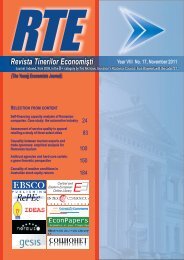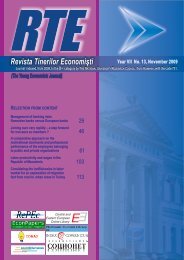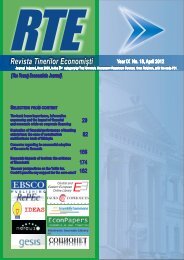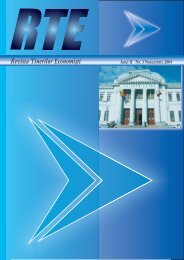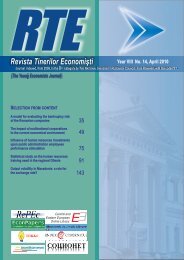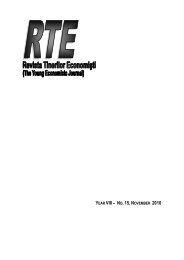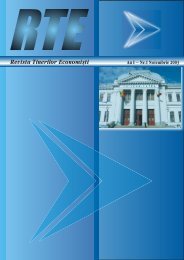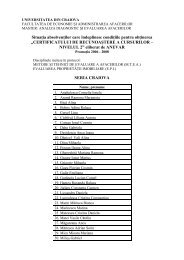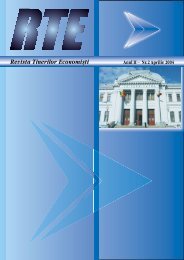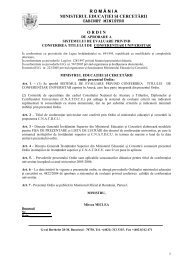Revista Tinerilor Economiºti (The Young Economists Journal)
Revista Tinerilor Economiºti (The Young Economists Journal)
Revista Tinerilor Economiºti (The Young Economists Journal)
Create successful ePaper yourself
Turn your PDF publications into a flip-book with our unique Google optimized e-Paper software.
<strong>Revista</strong> <strong>Tinerilor</strong> Economişti (<strong>The</strong> <strong>Young</strong> <strong>Economists</strong> <strong>Journal</strong>)<br />
of the whole process of adjustment to specific standards of similar institutions of the<br />
European Union depends crucially on how managers manage issues at all levels to<br />
change, know how to prepare people to help them overcome fear of the unknown<br />
uncertainty, it is in their midst, to form a team, knowing how to choose the optimal<br />
strategy for change. Change management is the key to success of any leader.<br />
He came to the conclusion that successful change starts from the human<br />
resources planning. We need people right in the number of necessary skills, knowledge<br />
and experience in appropriate positions at the right place and right cost. Even so, these<br />
conditions are not sufficient to ensure the desired result. Internal coherence and<br />
cohesion of employees are outside the responsibility of the driver. Among the basic<br />
requirements of an effective management is the concept of leadership. A leader can<br />
excite the team and to lead to results, can do more than that: to ensure internal<br />
consistency and external cohesion, develop creative and responsible departments to<br />
optimize the performance of each member of the team where he can give a yield up,<br />
manage conflicts and disputes, personal needs to harmonize the organization's values.<br />
Military Leadership and management are different, although they are<br />
interdependent and interrelated work and life in the army, seen as a social organization.<br />
Leadership is seen as a type of interpersonal influence that causes an individual to<br />
another individual or group performing the duties that first wants to see carried out. <strong>The</strong><br />
notion of influence is paramount to leadership. Influence is the effect of power exerted<br />
on others. It is a behavioral response, results of the exercise of official power and / or<br />
informal. Leadership is all the more appropriate individual to exceed the model as<br />
charismatic in favor of participatory democracy. Organizational Leadership is the<br />
ability to support leaders to promote consistent application of principles for the<br />
integration of authority and responsibility in the act of leadership. Leadership focuses<br />
on a state domestic political stability and security and foreign policy of smart<br />
partnerships and effective now and in the future.<br />
After the experience of dictatorial communism, Romania has to avoid the<br />
model of charismatic leadership exacerbated the individual, not to fall into the trap of<br />
cheap politics and unproductive, which can seriously undermine the major national<br />
interests. Romanian Organizational Leadership exceeds the transactional model to<br />
evolve to higher models, which seek to involve genuine moral and responsible members<br />
of national organizations and society in general. Both individual leadership and<br />
organizational leadership in Romania and the state must establish and comply with their<br />
approaches to leadership, smart and applied to the realities of present and future<br />
interests and ideals. Leadership of the Romanian state must overcome the frustrations<br />
that you grind past resentments or internally, to promote actions that serve the assertion<br />
of national dignity and fulfillment of aspirations for the future of the Romanian nation.<br />
<strong>The</strong> need for change comes from factors related to Legality - public order<br />
policies are strictly observing the rights and fundamental freedoms and the rule of law,<br />
professionalism - requires specialization and diversification of methods and means of<br />
action, a scientific policy, institutional flexibility, the implementation of a management<br />
proactive and, in particular, support decision-based analysis, dialogue - building a<br />
relationship of trust with citizens, through transparency and communication, in<br />
accordance with the principles of tolerance, respect and freedom of expression,<br />
professional integrity - accountability in spending public money and conduct all<br />
activities in public policy, partnership - cooperation against crime, both citizens and law<br />
enforcement institutions, nationally and internationally, as well as other public or<br />
86



